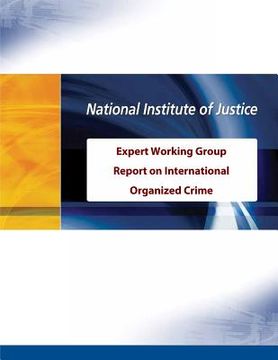Reseña del libro "Expert Working Group Report on International Organized Crime (en Inglés)"
In January of 2010, the International Center of the National Institute of Justice (NIJ) assembled international experts and practitioners to assess the state of research on international organized crime (IOC). Two recent developments made this an opportune time for a working group to engage in a robust and critical reflection. The first was an expansion of IOC research. Although the number of books, journal articles and reports on IOC have steadily increased in recent years, the ways IOC research has expanded in other ways made this a good time to call such a meeting. For example, IOC research now goes beyond the traditional disciplines of criminology and sociology to include anthropology, economics, political science, history and other academic disciplines. Moreover, scholarly examination of IOC has gone beyond description and has increasingly focused on critical issues, such as how to improve the scientific rigor of IOC research. Last, this research now uses a mixture of methodologies, including historical, experimental, quantitative, qualitative and case study designs and increasingly implements international or comparative research designs to expand the geographical breadth of studies.Dovetailing with this growing interest in IOC research is an accelerating effort to develop new strategies to address the IOC threat in the United States. Although not limited to the U.S. Department of Justice (DOJ), the DOJ's efforts are indicative of how this effort is unfolding. In 2008, DOJ released the Law Enforcement Strategy to Combat International Organized Crime, which outlined steps to revise its efforts to address IOC. The Attorney General also reconvened the Organized Crime Council (AGOCC), an interagency body that coordinates Federal law enforcement activity against organized crime. In reconvening the AGOCC, which had not met for 15 years, the Attorney General asked that it oversee the implementation of the law enforcement strategy and directed it to focus more on the IOC threat. In 2009, DOJ continued to implement the law enforcement strategy with the formation of the International Organized Crime Intelligence and Operations Center (IOC-2). Through IOC-2, DOJ and other federal agencies are now able to marshal the resources and information of nine U.S. law enforcement agencies and numerous federal prosecutor offices nationwide.The Expert Working Group (EWG) advanced NIJ's efforts to meet two goals. First, NIJ fostered a new level of cooperation between researchers and practitioners. Although the level of participation in the EWG is a measure of this new cooperation, so too are the number of contacts that have continued after the meeting. Second, NIJ has been able to identify promising agendas for the IOC research community and for federal practitioners. This report provides the IOC research community with suggestions from the research and practitioner communities that can help steer the direction of IOC research for years to come.NIJ has tasked the EWG to explore seven areas of IOC research, using a three-part rubric consisting of the quality of existing research, the most promising research agendas, and the most problematic methodological or programmatic obstacles (see Appendix A). The first issue was to examine what what we know about IOC. The group conducted a summary of existing IOC research and assessed its general qualities and its gaps. The second issue was to probe what IOC research should be pursued? This led into an important discussion about the impact that suggested research agendas could have on policy and practice. Last, and most important, the question of how to accomplish such research was addressed. The group identified the most effective research methods, explored what data was needed, and named the barriers that would impede these studies as well as ways to circumvent or mitigate them.

